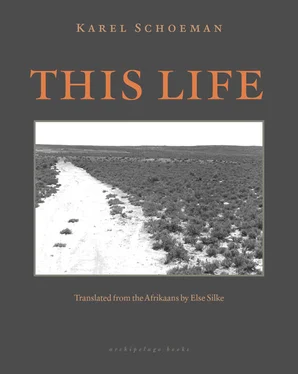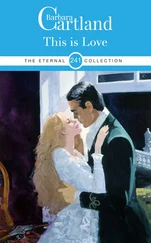
Gradually I recovered and adapted to the routine of the house and farm once more. For a while my reticence was still tolerated, but not for long, and one day I was sitting in the voorhuis when Dulsie pressed the baby into my arms impatiently. “There, take the child, he’s yours,” she snapped, and that is how I was given custody of Maans. He was just beginning to walk and he was a lively child, but he was never really naughty or disobedient and, as for me, I had all the time and patience in the world. We were good company for each other, for even when he began to talk, it was some time before he learned to understand or wonder or ask, and so it was possible for me simply to carry on at first, without having to think or remember. Moreover, he was a beautiful child, with Jakob’s dark eyes; of course Sofie had dark eyes too, but Maans was Jakob’s child, entirely his, or so I always thought. I came to love that child who had been given into my care so unexpectedly; yes, I loved him, until he grew up and outgrew me, and now there is almost nothing left of that closeness. He was in the house with me all day, either in my arms or on my lap, and later I took him out for short walks in the veld, until eventually I was no longer afraid of the space and the light; later it was good for me to have an excuse to escape from the quiet, gloomy house and sit in the veld with Maans playing near me. Dreamily, I turned my face to the sun again, unaware of what I was doing. I discovered anew the daylight and the day, and the familiar world revealed itself to me once more. They are coming, they are coming; but I could no longer remember who, and I tried to keep the remaining memories at bay while I gazed mindlessly at the distant glitter of the dams in the light, until Maans became impatient because I did not listen or reply, and playfully tugged at my clothing or pulled my hair until it came undone and billowed around my head and across my face. As a child I went along with others without asking where we were going, others led me, carefree, by the hand; now I took this child out for walks and decided on our destination myself.
Father tried to find someone to work for him in Gert’s place, but none of the Basters he hired was as clever or trustworthy as Gert, and after a while some omission or oversight was always discovered, or there were complaints and objections, and the man bundled up his few possessions and left with his family; or otherwise the wives came to help in the house and quarrelled with old Dulsie, or Mother lost her temper and flew into them with a bundle of harpuisbos twigs as was her wont, and then the woman shouted angrily that she would not stay here a moment longer and urged her husband to claim his wages and leave. It became more and more difficult to find suitable workers, for it was during this time that the Basters in the Roggeveld were being forced from the land they owned or inhabited amongst us, and later no outspan or winter quarters or grazing was available to them, so that one by one they moved away from our region with their rickety wagons and their handful of sheep; it was probably also during those years that Father made the first of his land purchases, though as a child I knew nothing about it, neither did I have any interest in it. Thus, of all the families that worked for us briefly after Gert’s departure, I no longer remember individual names or faces, only a few anonymous voices, scraps of conversation at the back door or in the kitchen, jokes, shouts, curses or rhymes that still sound in my ears, swirling around me in the dark, entwined and entangled after all the years, forming new patterns in which I can no longer recognise the familiar threads. They are dead and gone, every last one of them, leaving me without a name or a face, buried outside the wall encircling the white people’s graveyard, or somewhere along the road in the Karoo, or farther north in the interior where their journey had taken them, near Groot River, and the stones that were stacked over them have been scattered and washed away; their children and grandchildren have died too, somewhere on a plain, in a kloof or beside a campfire, and the last memory of their existence has been wiped out. Only their voices still sound in my ears here where I lie awake in the night.
Someone puts a karee log on the fire in the hearth, someone throws a handful of harpuisbos twigs on the fire, so that it crackles and flares, and I hear Dulsie’s voice as she coughs over her clay pipe, and then the others join the circle one by one; but the faces, fleetingly visible in the dancing firelight at the hearth, have become obscure to me. “The mountain big and blue, O how will I get through …” Who sang or hummed that song? “I seek them in the mountains …” — but that was Gert, that was earlier. Rhymes, verses, songs, like the ones Gert always used to make up.
“ Cain and Abel had a fight
Who had the pretty maid in sight?
Rode away into the night ,
Never more to see the light …”
But who was it? It is not Gert’s voice sounding in my ears, though I still remember the words clearly.
“ Abel was murdered by his brother ,
Was seen by another …”
Words I did not understand as I sat listening in the dark; furtive laughter I did not understand and a sudden hush when someone approached, Mother on the threshhold of the kitchen … “Jakob’s voice and Esau’s hands”, and the women’s screams as the group scattered. Jakob’s voice and Esau’s hands, and how angry Mother had been, how relentlessly she had thrashed about with the stick she had grabbed, with pale, stony face and burning eyes, and the women in the kitchen scattering to escape, fleeing from the house. Esau’s hands … What had infuriated her so? The next day the woman who had said it left with her husband and her children and their few goats, and from the yard she shrieked imprecations in the direction of the house while Mother slammed the kitchen door and turned away, pale and trembling with silent fury. It was during that time, I am certain, for Gert had already left and Jakob lay in the graveyard under the stones that had been stacked over his grave, so I knew they could not have been talking about him. Or could it have been he — Jakob, who had slipped and fallen into the dark crevice on the mountainside, hands out-stretched against the rock?
Now I remember again: suddenly the thread running through the design becomes clearly visible in the dark. The women were saying what a beautiful child Maans was. Pieter had also been such a spindly little thing when he was small, Dulsie went on; Jakob was never like that. Yes, one of the women added, it is Jakob’s voice but Esau’s hands, and the people sitting at the hearth in the dark burst out laughing as if they understood the words, just as Mother entered the kitchen and overheard them. I did not understand, or perhaps I simply chose not to understand, just as I always did when a choice was possible for me; but in the end understanding was inevitable as the stories did the rounds, stories repeated with unexpected acrimony or slipping out before the speaker could help it, stories repeated because no one realised I was present or because they thought I could not hear; warp and woof woven together over the years into a tapestry in which I can finally make out the pattern. Could Maans have been Pieter’s child? In later years, when it became possible for me to ponder and to question, many years later, when I was growing older and Pieter himself was approaching the end of his life, I often reflected on this matter, and at times Maans must have wondered why I was gazing at him so quizzically, as if I were searching for something in his features. I never found anything, however, no, I never did believe that Maans could be Pieter’s child; but that must have been what people in those parts believed or wanted to believe and what they told each other, until even I became aware of it, until it became an accepted fact that no one questioned any more and in its own way the rumour became more important than anything that might actually have occurred. But who still remains that knew Jakob and Sofie, or cares about Pieter’s memory; who still speaks of these matters? Who remembers?
Читать дальше













